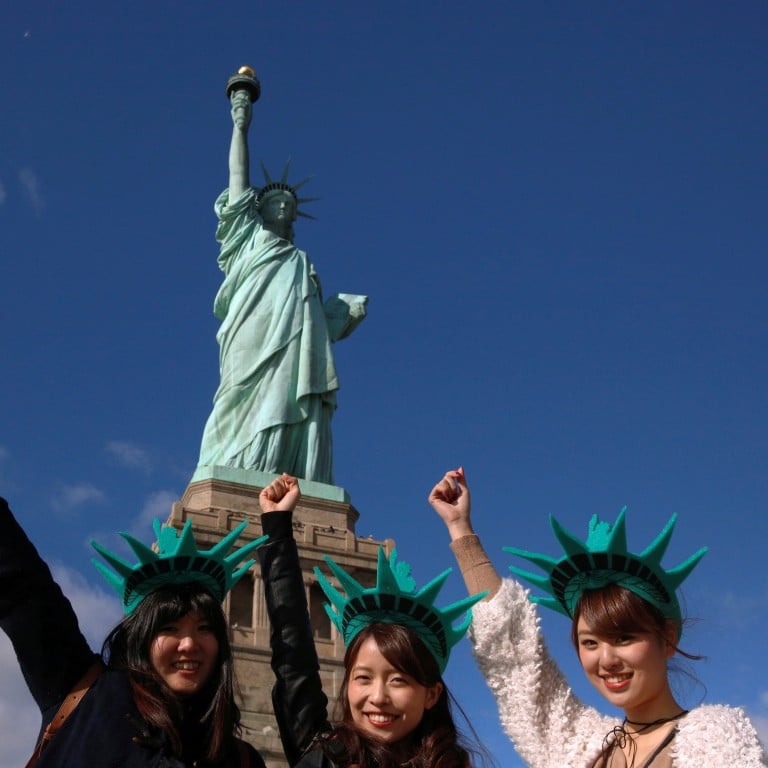
Who are the world’s best tourists? Japanese take the top spot in survey of 26 countries
- Much thought has been given to the world’s worst travellers, but the best deserve some recognition
- A recent YouGov study explored the attitudes of respondents from 26 countries around the world, almost all agreed on the top spot
Many column inches and much thought have been dedicated to identifying the country responsible for spawning the world’s worst tourists. Less consideration has been given to those who occupy the other end of the spectrum, those who navigate the globe with such dignity and poise that they go unnoticed – or at least unrewarded – all thanks to their impeccable comportment.
According to a recent international study conducted by British market research and data analytics company YouGov, “one nation stands out above all others”. When asked where they believed the best travellers hailed from, respondents from 26 countries across Europe, Asia and the Arab world, as well as the United States and Australia, all (with the exception of Italy) singled out Japan. In Finland, Spain, Indonesia, Malaysia, the Philippines, Singapore and Thailand, visitors from the Land of the Rising Sun were considered worlds ahead of sightseers from anywhere else.
The poll does not dissect why Japanese tourists are held in such high regard, but it could be something to do with their reputation for extreme politeness. Remember when Japanese soccer fans stayed behind to clean the stadium after watching their team lose to Belgium at last year’s Fifa World Cup, in Russia? Turns out that modest acts of mindfulness do go viral, after all.

At the heart of such civility are two culturally ingrained concepts, omotenashi and tatemae, argues online tourism platform Live Japan.
The former philosophy, often translated to mean “hospitality”, is actually much more. “It’s also a sharp eye for detail, awareness for individual needs, and the effort to always go the extra mile,” states the website, adding that it is fundamental to the kindness the Japanese have become known for.
Tatemae is how people in Japan present themselves to the outside world; the keeping up of appearances rather than letting true feelings show, or, as Live Japan puts it, “the effort to look good in the eyes of others”.
That they were so respected by the respondents surveyed suggests there is a basis to the stereotype that Japanese tourists are both polite and kind, qualities that make them excellent sightseers and give them a significantly better standing than Britons (“louts”), Americans (“entitled”) and Chinese (“disrespectful”).
However, despite being seen as “culturally insensitive”, Australians scored well across the board in the YouGov poll (although not in Arab nations, or, once again, Italy), so perhaps we should all put stereotypes aside and judge each visitor on their own merit.
The Japanese probably have a word for that.
Bali macaque thefts are costing Australian insurers

Bali’s wildlife has a lot to answer for, including hundreds of dollars in insurance claims, according to a major insurer.
On September 3, Australian news website news.com.au reported that Cover-More, a Sydney-based insurance provider, had assessed its travel claims for 2018 and found that those pertaining to lost, stolen or damaged items accounted for 27 per cent of cases from Indonesia, many of which involved sticky-fingered non-human culprits.
The popular resort island of Bali was ground zero for monkey-related thefts, mischievous macaques having made off with sunglasses, prescription spectacles and a watch. On a more serious note, snatches by motorbike-riding thieves were also on the increase, so tourists should remember to take good care of their belongings whether in the presence of bikers or beasts.
Vietnam’s Monkey Island attracts critics along with its visitors

From one simian-themed attraction to another, this time in Vietnam, where aggressive macaques are accosting visitors to Monkey Island, in Ha Long Bay. On September 6, Agence France-Presse reported that tourists who chose to alight on rustic Reu Island were told to show the monkeys empty hands to avoid having snacks, drinks, phones, hats and more stolen by the island’s impish inhabitants, which have come to associate sightseers with swag.
However, the destination has come under fire from activists, its animal attractions having been taught to ride bikes, lift weights and shoot basketball hoops.
“Monkeys don’t choose to walk on their hind legs, ride bikes, or perform other meaningless and humiliating tricks – they’ve simply learned to fear what will happen if they don’t,” Jason Baker, vice-president of international campaigns at People for the Ethical Treatment of Animals, Asia, told Agence France-Presse. “Travel companies and tourists must stop buying tickets to cruel exhibits like Monkey Island.”

